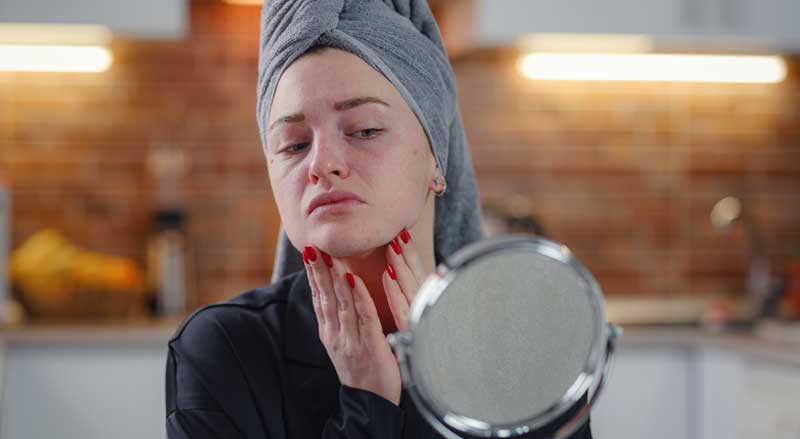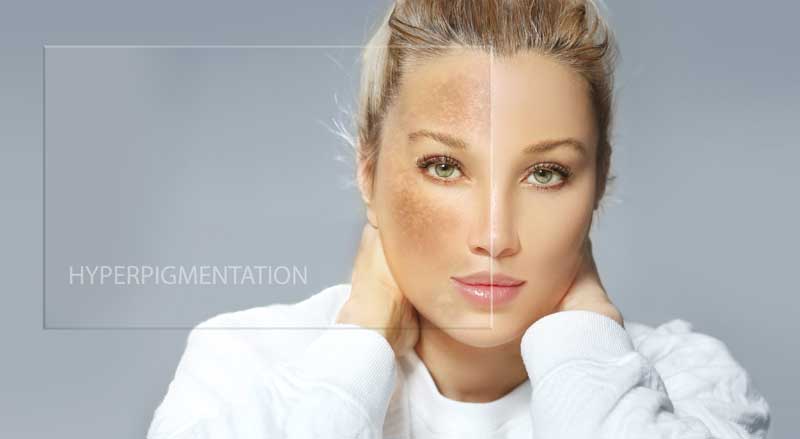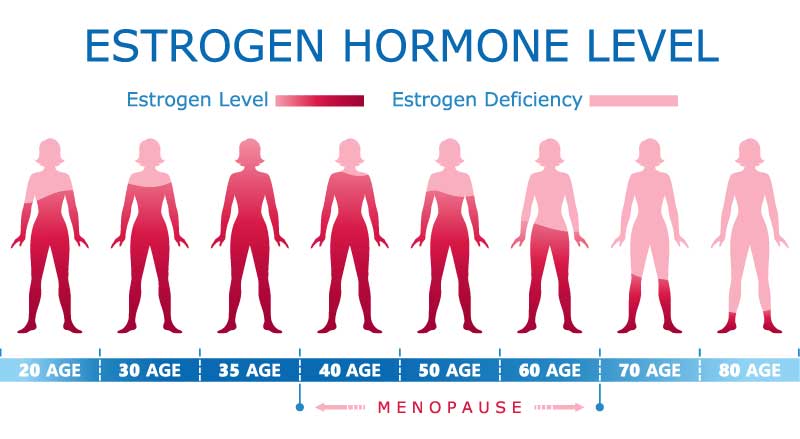How Hormone Changes Can Affect Your Skin
Posted on |

Here you will learn how hormone changes can affect your skin, why your skin is changing, and what you can do about it.
You’ve heard people say, “the eyes are the window to the soul.” But did you know dermatologists consider the skin to be a window to your overall health?
What are Hormones?
Hormones are chemical substances that have been secreted by glands and travel through your bloodstream. They act as messengers to help your body regulate responses regarding mood, reproduction, sexual function, growth, metabolism, and more.
Sometimes hormonal activity will inadvertently change your skin. The three main hormones that affect skin are estrogen, progesterone, and testosterone.
Estrogen
Estrogen has a desirable effect on the way your skin looks and feels. It stimulates elastin, collagen, and hyaluronic acid production. These are the natural substances that make your skin plump, smooth, firm, and hydrated. In other words, they make your skin look youthful and feel comfortable to be in!
If estrogen becomes low, your skin will feel dry and itchy.
Progesterone
Progesterone stimulates the oil glands in the skin. A healthy amount of progesterone will reduce the look of pores. However, too much progesterone can cause skin to become oily.
Testosterone
Testosterone, like estrogen, also supports collagen and skin elasticity. It helps skin look supple and firm. However, testosterone will also increase oil production. Elevated levels of testosterone in people in their mid-30s and 40s can cause adult acne. When testosterone levels are low, skin may feel dry and become thin.
Hormones Change as We Age
Puberty and Adolescence
Hormones production can be sporadic during the teen years. Skin looks healthy and heals easily, but the skin can also be prone to breakouts.
Teen acne is usually a result of surging estrogen, progesterone, and testosterone. The testosterone causes the receptors in the skin to create more sebum, which leads to acne.
Cleansing and moisturizing skin helps fight the resulting excess oil that clogs pores. Acne will also worsen if there’s excess sugar in your diet.
Testosterone is both a male and female hormone. But since men usually have more testosterone, their acne may be worse.
Doctors sometimes prescribe birth control pills to control acne in adolescent girls. The birth control pills cause the ovaries to temporarily shut down, reducing testosterone production.
Pregnancy Related Skin Changes
Elevated hormones during pregnancy can cause skin problems, such as breakouts or skin discoloration. Happily, most of these issues go away shortly after childbirth.
Melasma

Melasma is a common skin condition of pregnancy that causes hyperpigmentation on the face. In fact, the NIH reports that melasma’s prevalence in pregnant women is between 50% to 70%.
Melasma can also appear in men at a much lower percentage.
Melasma looks like dark brown patches of skin around the upper lip, nose, forehead, or cheeks. Existing moles or birthmarks can even change color. These changes are not a health risk but should be brought to the attention of a doctor if changes don’t reverse several months after childbirth.
During pregnancy, the elevated levels of estrogen and progesterone make skin more sensitive to sunlight.
If you are concerned about developing melasma during pregnancy, avoid sunlight and stay in shade whenever possible. Use a pregnancy-safe sunscreen to help keep melasma from developing.
Perimenopause, Menopause and Post Menopause
Perimenopause
Perimenopause usually begins when a woman is in her forties or even thirties. This period of reducing estrogen can last as long as 10 years. It will affect periods, hot flashes, skin, and more.
Skin can appear:
- More oily or more dry
- Itchy
- Less elastic or thinner
- With more fine lines and wrinkles
- Red
- Sensitive
- Sagging
These changes will first show up where your skin is the thinnest—around the neck and eyes.
Menopause and Postmenopause
Menopause refers to the time when a woman has not had a period for over a year; it usually occurs between ages 45 and 55, although it can occur at a younger or older age. A woman is said to be postmenopausal once she hits menopause.

As women age, estrogen levels decrease causing collagen and elastin production to slow. Changes appear in the skin. Fine wrinkles and skin thinning begin to appear. As skin changes continue there’s more severe dryness, wrinkling, facial sagging, and loss of thickness. Skin may also heal slower.
Since estrogen production is lower, use sunscreen daily to protect the skin from UV light and development of age spots.
How To Fight Hormonal Changes in the Skin
Diet

Eat a healthful diet rich in antioxidants. Antioxidants will help protect skin against environmental stressors. Some antioxidant-rich foods include:
- Blueberries
- Broccoli
- Cabbage
- Avocados
- Lettuce
- Sweet potatoes
- Kale
Also, learn how your diet can boost collagen production in your body.
Read how juicing will help your skin.
Also, learn about the best vital nutrients for your skin, hair and nails.
Lifestyle
Try to keep stress to a minimum, exercise regularly, and get enough restful sleep. Exercise doesn’t have to be stressful—it can be simply walking or taking a yoga class.
Spend some time relaxing. Visit with a good friend, journal, meditate, or read a good book outside in the yard.
Here are some great tips to fight fatigue.
Also, don’t smoke and try to drink less alcohol.
Skin Care
When these hormonal changes occur, it’s important to moisturize cleaned skin to help skin look smoother, firmer, and more youthful.

At Vibrance MedSpa, we have many facial treatments to make your skin appear more youthful and glowing.
We offer a complete aesthetics consultation before treatment to determine which exact skin treatment will get you the results you want.
Contact us for skin that looks and feels refreshed, revitalized, and more youthful.
